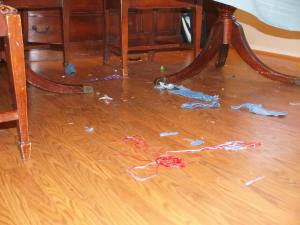Awhile back all three children were happily making things at the dining room table. At some point, they stopped (I must have told them to clean up, but I’m not sure). When I came later to inspect the dining room table, I discovered it was completely clean. The kids actually put everything away properly.
I was dismayed, however, to see the floor. They obviously didn’t look down. In fact, two children left their projects on the floor. (How can this be?!) By this time, they were all doing other things, and I sat, trying to decide what to do about this floor. (If you are a Type A mama, then perhaps you find it strange that this decision stumped me. Decision points like this often stump me. It’s normal here.)
First, I noticed, that they actually did a good job clearing the table. They weren’t avoiding work; they just didn’t finish it. Second, I suspected that they didn’t even see the floor (given that two craft projects were on the floor) and the messy floor was probably immaturity rather than character. Third, I highly value occasions where all my children are happily working together. I don’t want to leave them with the idea that working together means mom is going to be mad when we don’t get everything right. (it’s possible that correcting them will cause them to be more responsible, but at this point in their lives I think it will cause them to find another activity.)
Because I want to encourage an emerging skill (clean up), I opted not to tell them at all that I cleaned up the floor. They had no idea it was a problem. They were likely satisfied that they had done a good job cleaning up, and I wanted to leave them with those positive feelings about being responsible. There will be other occasions where I have them clean the floor, too. This just wasn’t one of them.
What biblical principles bear on this situation?
- Different actions require different responses (Now we exhort you, brethren, warn those who are unruly, comfort the fainthearted, uphold the weak, be patient with all. I Thessalonians 5:14)
- A good parent remembers the limitations and frailty of her children. (13 As a father pities his children, So the Lord pities those who fear Him.14 For He knows our frame;He remembers that we are dust. Psalm 103:13-14)
- Love covers sins. In contrast, hatred stirs up strife. I’ve been thinking about this contrast– are my actions likely to calm their spirits or stir up strife? (Proverbs 10:12)
- God never gives us a task or trial too much for us to bear. As a mom, I want to be sensitive to what is overwhelming, and how I can help them grow in their ability to accomplish difficult things. That’s how God works, too. He does stretch us. We need great wisdom to know when to stretch, and when our children have reached the end of good stretching. (I Corinthians 10:13)
What other scriptures can you think of that might be relevant to the messy floor?

I love your response and the principles you used to formulate your response. I appreciate how you’ve influenced me to think this way!
Addy! Thanks for your encouragement. I love to see how biblical principles work out in your personality and life! We really need to find a way for a coffee date someday!